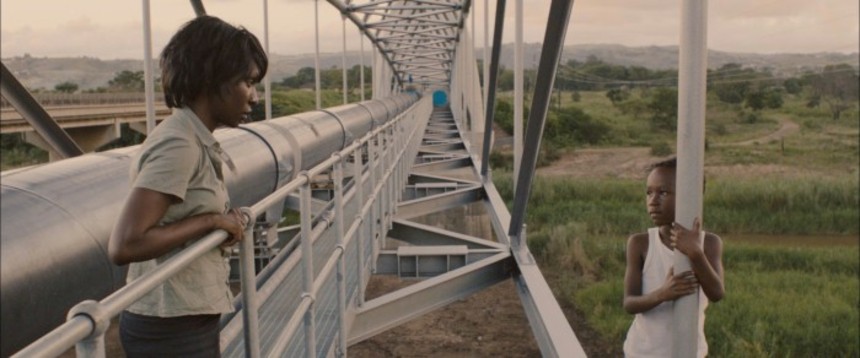Berlinale 2013 Review: LAYLA FOURIE Isn't The Paranoid Polygraph Thriller It Could Have Been

It's disappointing also because the first twenty minutes are spectacular. The film opens with Layla talking a lie detector test is Johannesburg as part of a job interview to administer lie detector tests, a situation which would probably make Brian De Palma smile. The interviewer repeatedly asks her how often she lies and reminds her sternly that, should she be hired, it's her job to "represent the truth." It's an ominous scene, and immediately establishes an interesting milieu for a neo-noir.
After the interview, we learn a bit more about Layla, a tough, hard-working single mother moonlighting as a server at a bar while looking for steady day work and trying to take care of her young son. Rayna Campbell instills the character with understated intensity, letting her evocative face and eyes do most of the heavy-lifting, which mostly makes up for some occasional stilted dialogue-delivery.
As expected, she gets the job. Unable to find anyone to watch her son, Layla takes him on a road trip for her first assignment to administer a polygraph test during job interviews at a wealthy resort. At this point, the film is still shrouded in mystery and paranoia, which is only heightened by the security-obsessed setting of post-apartheid South Africa. Even the way that Layla constantly double checks every door lock suggests something amiss, though most likely, that's simply the way of life in South Africa right now.
It turns out though, Layla actually only needed to worry about herself. On the way to the resort, during one of the the darkest, loneliest and moodiest night time drives I've ever seen in a film, Layla accidentally hits and kills a man. Terrified of what will happen to her son if she is sent to jail, and aware that the man is white and she isn't, she decides to hide the body in the dump.
It's about here that the film morphs from a layered, subtly political thriller into an awkward, increasingly implausible combination of The Virgin Spring/Last House on the Left and Crime and Punishment. Layla not only interviews the dead man's son the next day as part of her assignment, but somehow ends up running into him again, then somehow staying at his mother's house... and on and on. Rather than increasing the scope of the story or deepening the intrigue and mystery, co-writer/director Pia Marais shifts the focus to Layla's moral conundrum of whether to reveal her crime to the man or not. The polygraph machines and her expertise end up serving mostly as filler, along with increasingly unbelievable chance meetings, and a few baffling decisions on Layla's part.
So, as a thriller, the film doesn't quite work. However, it's much more effective and creative in the way it portrays the struggles of being a single mother. Layla's child, like most children, is impatient, mischievous and stubborn, and the most convincing and suspenseful scenes are driven by the total unpredictability of his actions. Placing a young child in the middle of the dark moral tale is actually a kind of brilliant way to illustrate the difficulties of a struggling single mother without resorting to repetitive, slice-of-life neo-realism. And again, the setting and the political implications (at least at first) work so well in a paranoid thriller, it's kind of baffling that someone hasn't tried this before. If only Marais was able to work all of these elements into a more compelling overall script, Layla Fourie would be a fascinating film indeed. As it stands, its an intriguing, fitfully interesting near-miss.

Do you feel this content is inappropriate or infringes upon your rights? Click here to report it, or see our DMCA policy.






